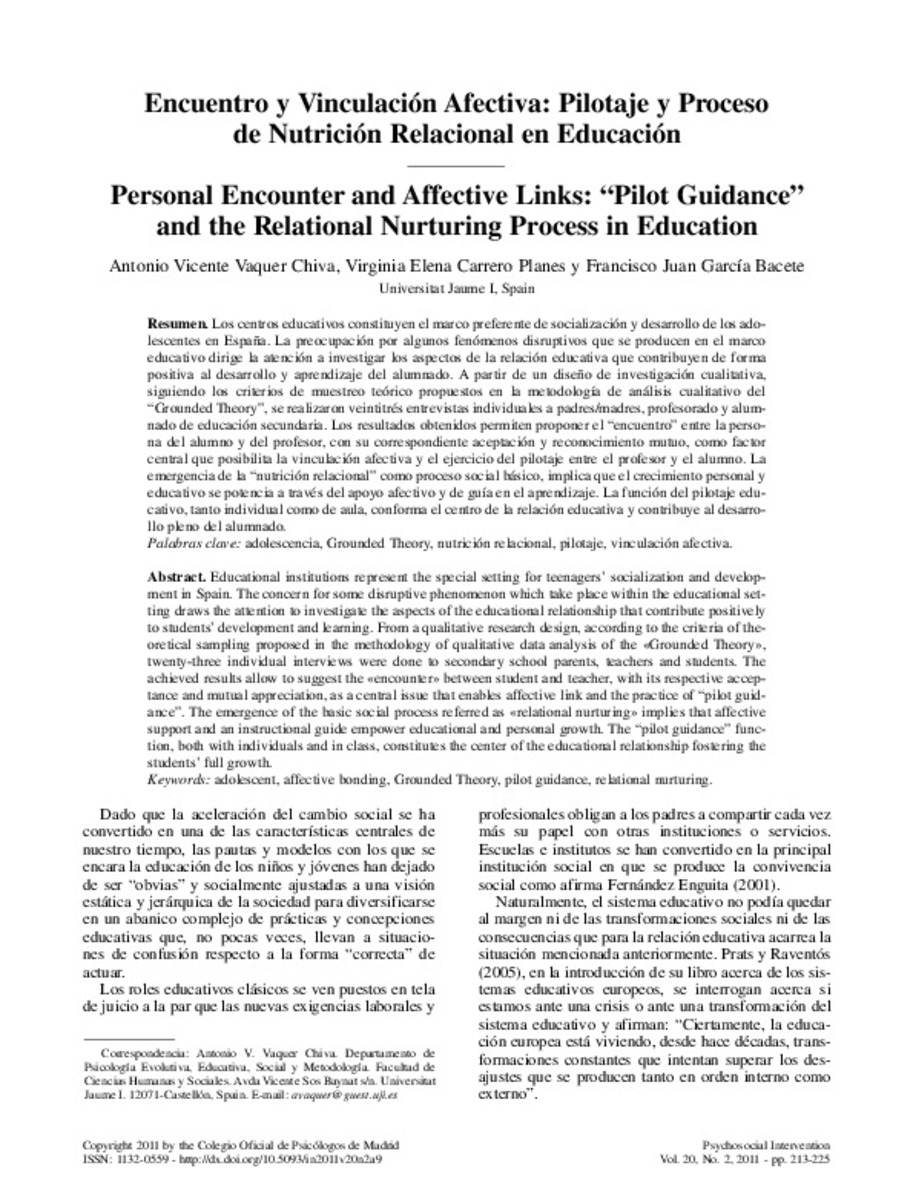| dc.contributor.author | Vaquer Chiva, Antoni | |
| dc.contributor.author | Carrero Planes, Virginia | |
| dc.contributor.author | García Bacete, Francisco Juan | |
| dc.date.accessioned | 2012-06-05T06:37:56Z | |
| dc.date.available | 2012-06-05T06:37:56Z | |
| dc.date.issued | 2011 | |
| dc.identifier.citation | Intervención psicosocial (2011) vol. 20, núm. 2, p. 213-225 | ca_CA |
| dc.identifier.issn | 1132-0559 | |
| dc.identifier.uri | http://hdl.handle.net/10234/40941 | |
| dc.description.abstract | Los centros educativos constituyen el marco preferente de socialización y desarrollo de los adolescentes en España. La preocupación por algunos fenómenos disruptivos que se producen en el marco educativo dirige la atención a investigar los aspectos de la relación educativa que contribuyen de forma positiva al desarrollo y aprendizaje del alumnado. A partir de un diseño de investigación cualitativa, siguiendo los criterios de muestreo teórico propuestos en la metodología de análisis cualitativo del “Grounded Theory”, se realizaron veintitrés entrevistas individuales a padres/madres, profesorado y alum- nado de educación secundaria. Los resultados obtenidos permiten proponer el “encuentro” entre la persona del alumno y del profesor, con su correspondiente aceptación y reconocimiento mutuo, como factor central que posibilita la vinculación afectiva y el ejercicio del pilotaje entre el profesor y el alumno. La emergencia de la “nutrición relacional” como proceso social básico, implica que el crecimiento personal y educativo se potencia a través del apoyo afectivo y de guía en el aprendizaje. La función del pilotaje educativo, tanto individual como de aula, conforma el centro de la relación educativa y contribuye al desarrollo pleno del alumnado | ca_CA |
| dc.description.abstract | Educational institutions represent the special setting for teenagers’ socialization and development in Spain. The concern for some disruptive phenomenon which take place within the educational setting draws the attention to investigate the aspects of the educational relationship that contribute positively to students’ development and learning. From a qualitative research design, according to the criteria of theoretical sampling proposed in the methodology of qualitative data analysis of the «Grounded Theory», twenty-three individual interviews were done to secondary school parents, teachers and students. The achieved results allow to suggest the «encounter» between student and teacher, with its respective acceptance and mutual appreciation, as a central issue that enables affective link and the practice of “pilot guidance”. The emergence of the basic social process referred as «relational nurturing» implies that affective support and an instructional guide empower educational and personal growth. The “pilot guidance” function, both with individuals and in class, constitutes the center of the educational relationship fostering the students’ full growth. | ca_CA |
| dc.format.extent | 13 p. | ca_CA |
| dc.format.mimetype | application/pdf | ca_CA |
| dc.language.iso | spa | ca_CA |
| dc.publisher | Colegio Oficial de Psicólogos de Madrid | ca_CA |
| dc.rights | © Colegio Oficial de Psicólogos de Madrid | ca_CA |
| dc.rights.uri | http://rightsstatements.org/vocab/InC/1.0/ | * |
| dc.subject | Adolescencia | ca_CA |
| dc.subject | Grounded Theory | ca_CA |
| dc.subject | Nutrición relacional | ca_CA |
| dc.subject | Pilotaje | ca_CA |
| dc.subject | Vinculación afectiva | ca_CA |
| dc.subject | Adolescent | ca_CA |
| dc.subject | Affective bonding | ca_CA |
| dc.subject | Pilot guidance | ca_CA |
| dc.subject | Relational nurturing | ca_CA |
| dc.title | Encuentro y vinculación afectiva: pilotaje y proceso de nutrición relacional en educación | ca_CA |
| dc.title.alternative | Personal encounter and affective links: “pilot guidance” and the relational nurturing process in education | ca_CA |
| dc.type | info:eu-repo/semantics/article | ca_CA |
| dc.identifier.doi | http://dx.doi.org/10.5093/in2011v20n2a9 | |
| dc.rights.accessRights | info:eu-repo/semantics/openAccess | ca_CA |
| dc.relation.publisherVersion | http://www.psychosocial-intervention.org/&lang=en&secc=actual&articulo=20110727140519843000 | ca_CA |
| dc.type.version | info:eu-repo/semantics/publishedVersion | ca_CA |







